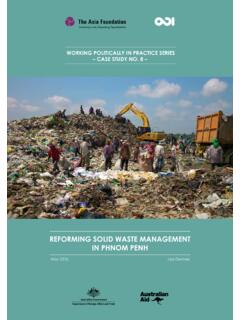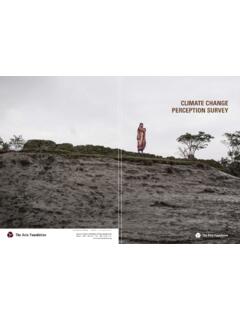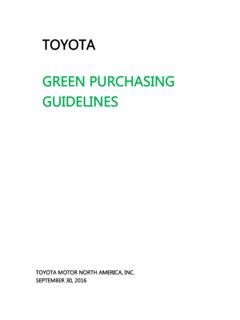Transcription of SOLID WASTE COLLECTION AND TRANSPORT - The Asia …
1 SOLID WASTE COLLECTION AND TRANSPORT . Service Delivery Training Module 1 of 4. MINISTRY OF LOCAL GOVERNMENT AND. PROVINCIAL COUNCILS. SOLID WASTE COLLECTION . AND. TRANSPORT . Service Delivery Training Module 1 of 4. 2008. MINISTRY OF LOCAL GOVERNMENT. AND PROVINCIAL COUNCILS. Contents | iii CONTENTS. Preface .. | 1. Introduction .. | 3. Session 1: Why SOLID WASTE COLLECTION is Required .. | 5. Session 2: Identifying Needs, Defining Constraints and Setting Goals .. | 8. Session 3: Characterize WASTE Generation and Service Area .. | 9. Session 4: Assessment of Existing Conditions .. | 13. Session 5: Options for Improving COLLECTION .. | 15. Session 6: Scheduling and Routing.
2 | 26. Session 7: Evaluation of Options for Transfer Mechanism .. | 28. Session 8: Estimation of Cost for COLLECTION and TRANSPORT .. | 30. Session 9: Personnel Management .. | 34. Session 10: Information Management for Performance Monitoring and Evaluation .. | 36. Session 11: Action Plan for Improving WASTE COLLECTION and TRANSPORT .. | 49. Exercises .. | 53. Exercise 1: Group Discussion and Presentation .. | 53. Exercise 2: Service Area Map .. | 54. Exercise 3: Evaluation of COLLECTION Options .. | 55. Exercise 4: Routing and Scheduling .. | 56. Exercise 5: Performance Reporting and Information Management .. | 57. References .. | 58. Preface | 1. PREFACE. The Asia Foundation (TAF) implemented the Transparent Accountable Local Governance (TALG) Program with financial support from the United States Agency for International development (USAID) from January 2005 - September 2007.
3 The Foundation's main counterparts were the Ministry of Local Government and Provincial Councils and the Sri Lanka Institute of Local Governance. The International City/County Management Association (ICMA) and Environmental Management Lanka (EML) provided additional technical assistance and support. The TALG Program developed a number of training modules and publications as part of its institutional strengthening programme for Local Authorities (LAs) in Sri Lanka. Each of the TALG training modules was used to train officials in thirty- five LAs in Southern, Eastern, Central, North Western, North Central and Uva provinces. These were very successful in promoting effective, transparent and accountable local governance.
4 Preparing the training modules was a painstaking process and support from the Australian Agency for International development (AusAID) enabled The Asia Foundation to complete and publish this and the other publications in the series. Introduction | 3. INTRODUCTION. Through the interventions made by the Foundation for the betterment of the Local Governance system in Sri Lanka, publications were developed in the following areas: Citizen Participation Local Planning Service Delivery Financial Management Policy and Regulations These publications range from one-page documents of Leading Practices to Training Modules. Major categories of the publications are: Training Modules Guidebooks Reports and Documents Video Films Computer Applications TALG developed many training modules mainly in the areas of Financial Management and Service Delivery.
5 SOLID WASTE COLLECTION and TRANSPORT is Module 1 under Service Delivery Training. Other training modules in the series include: Module 2: SOLID WASTE Reduction Module 3: Road and Drainage Maintenance Module 4: SOLID WASTE Planning and Disposal In addition to these training modules, TALG developed video films showing successful SOLID WASTE management (SWM). initiatives implemented by the Sri Lankan and regional LAs. Users should note that there are a range of TALG publications including Technology of Participation and Resource Directory for Local Authorities that can be used by LAs to create an enabling environment for improved SWM. About this Training Module Module 1: SOLID WASTE COLLECTION and TRANSPORT According to Sri Lankan legislation, LAs are legally responsible for providing SWM services.
6 However, SWM has become a burning issue as most LAs do not have proper plans in place to execute this task effectively. In general, Sri Lankan LAs spend nearly 35-40% of their annual budget on SWM of which 60 70% is spent on WASTE COLLECTION and transportation. Despite this expenditure, many LAs do not satisfy their citizens' expectations for WASTE management services. This publication deals with the issues relating to SOLID WASTE COLLECTION and TRANSPORT in LAs. 4 | SOLID WASTE COLLECTION and TRANSPORT What is Inside this Module The publications developed by TALG can be used by different users, ranging from beginners to practitioners, those working in LAs and for those working as partners with LAs.
7 This publication contains all of the resources developed for the delivery of a two-day workshop in SOLID WASTE COLLECTION and TRANSPORT . This training module provides comprehensive and detailed learning materials on SOLID WASTE COLLECTION and TRANSPORT that can be used as reference material for practitioners in LAs and as background information for trainers. This module describes the tasks and logistics of SWM COLLECTION ; analyzes COLLECTION systems; describes the principles and theory of transfer stations; and shows how to implement an efficient and cost effective COLLECTION and TRANSPORT system for LAs. Interactive assignments and exercises have been included throughout the training module.
8 Additional resources can be found at the end of the module, comprising of an action plan checklist, format for scheduling WASTE COLLECTION and guidelines on how to complete the Excel' spreadsheets. Attached to this module is a CD which provides a PowerPoint' version of the learning materials with a focus on the needs of LAs. Also included is an MS Excel' spreadsheet application developed to help LAs measure and monitor their performance in WASTE COLLECTION and TRANSPORT together with a guide for using this tool. The Main Objectives of this Module To provide guidance to LAs in Sri Lanka and officials who engage in SWM activities. To provide knowledge, skills and tools for planning LA WASTE COLLECTION and TRANSPORT activities in a systematic manner.
9 To assist LAs to deliver efficient and effective WASTE COLLECTION and TRANSPORT services and to monitor and manage the workforce engaged in COLLECTION and TRANSPORT . To assist LAs to ensure a satisfactory level of WASTE COLLECTION and TRANSPORT operation to meet the needs and demands of citizens. How to Use this Module The resources in this publication may be used: To enhance knowledge in this specific topic. To share the knowledge with others. To support a training programme and awareness campaigns. To improve the existing system and enhance performance monitoring. Trainers and beginners can use these learning materials to obtain knowledge on present practices and issues of SOLID WASTE COLLECTION and TRANSPORT in LAs.
10 Learning materials will provide guidance to all decision-makers and staff who are involved in SWM activities. It will also provide guidance on how to reduce SWM costs within LAs. Trainers can use the prepared PowerPoint' presentations to conduct awareness programmes for LA staff, decision- makers and other supporting staff. Group exercises can be used to improve practical experience of WASTE COLLECTION and TRANSPORT . User-friendly spreadsheets will help relevant officers to monitor daily activities on WASTE COLLECTION and TRANSPORT . This can be used not only for monitoring but also for the decision-making process. Why SOLID WASTE COLLECTION is Required | 5. SESSION 1: WHY SOLID WASTE COLLECTION IS REQUIRED.







